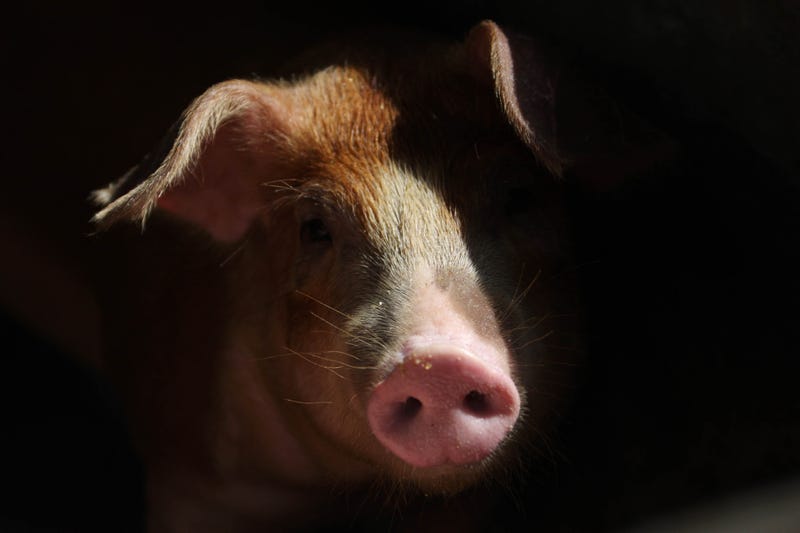
(WWJ) - The country recorded its first human swine flu infections of the year after officials with the CDC confirmed two people in Michigan came down with the disease when they came into contact sick pigs.
"These human infections were caused by two different types of flu viruses that normally spread among pigs," the Center for Disease Control said in a prepared statement released on Friday. "They occurred in two people who attended different agricultural fairs in Michigan and had exposure to pigs."
Both people, from Lapeer County and Tuscola County respectively, developed symptoms within 10 days of being around the animals and have since recovered with the help of antiviral medication -- and without the need for hospitalization.
As of now, no person-to-person spread of swine flu has been detected, officials added.
The first suspected case was made public on July 26 when the Lapeer County Health Department reported a resident and fair exhibitor -- whose name was not released due to being under the age of 18 -- received a positive test for an influenza A H3 strain of the virus not long after working with sick animals at the Oakland County Fair.
The fair ran from July 7 -16 at Springfield Oaks County Park in Davisburg.
Officials with the Michigan Department of Agriculture and Rural Development and the Department of Health and Human Service said a number of pigs began showing symptoms of the virus on July 14.
Oakland County Fair GM LC Scramlin told FOX2 that the event has never had anything like this happen before and organizers took swift action to contain the spread when the sick pigs were discovered.
A second positive test for Influenza A H1N1v was confirmed Friday, Aug. 4, in a Tuscola County resident who attended the Tuscola County Fair that ran from July 23-29 in Caro.
The resident was said to have developed flu-like symptoms not long after being around pigs.
"Agricultural fairs take place across the United States every year, primarily during the summer months and into early fall. Many fairs have swine exhibitions, where pigs from different places come into close contact with each other and with people," the CDC said. "These venues can increase the risk that flu viruses will spread among pigs and between pigs and people."
Health officials urged the public to take the following precautions when attending events or places where pigs are present to limit the spread of flu viruses between people and animals:
• Not eating or drinking while in pig areas,
• Avoiding contact with pigs that appear to be sick, and
• Washing hands often with soap and running water before and after contact with pigs.
If people must come into contact with pigs that are known or suspected of being ill, the CDC advised minimizing contact time with the animals and wearing personal protective equipment like protective clothing, gloves, and well-fitted masks that cover the mouth and nose when contact is required.
Scramlin said anyone who exhibits symptoms of Swine Flu should immediately contact their local physicians.
Symptoms of swine flu include:
• Fever
• Respiratory symptoms, such as cough and runny nose.
• Body aches.
• Nausea, vomiting or diarrhea.
State officials warned that influenza viruses, which include swine flu strains, are known to occasionally cause severe disease, even in healthy people, such as pneumonia, which can lead to hospitalization and, in some cases, death.
Children younger than 5, people 65 and older, those who are pregnant and those who have health conditions such as asthma, diabetes, heart disease, weakened immune systems and neurological or neurodevelopmental conditions are most at risk of complications from the disease.
"Pigs may be infected with swine influenza viruses that are different from human flu viruses," state health officials said. "Swine flu viruses spread among pigs and – while rare – they can spread from pigs to people too. Spread of swine flu viruses from a pig to a person is thought to happen in the same way that human flu viruses spread; mainly through droplets when infected pigs cough and sneeze."
Below are some steps you can take to protect yourself and prevent the spread of any illness:
• Avoid close contact with sick people
• Cover your nose and mouth with a tissue when you cough or sneeze. Throw the tissue in the trash after you use it
• Wash hands often with soap and water. If soap and water are not available, use an alcohol-based hand rub
• Refrain from eating or drinking in livestock barns or show rings
• Do not take toys, pacifiers, cups, baby bottles, strollers, or similar items into pig areas
• Anyone who is at high risk of serious flu complications and planning to attend a fair should avoid pigs and swine barns
• Avoid touching your eyes, nose, and mouth. Germs spread this way
• If you are sick, stay home from work or school until your illness is over
• Avoid contact with pigs if you have flu-like symptoms. Wait seven days after your illness started or until you have been without fever for 24 hours without the use of fever-reducing medications, whichever is longer
• Get an annual influenza vaccination
The time period it takes from exposure to illness for variant influenza is similar to that of seasonal influenza, which can be up to 10 days, but is most commonly three days.
At this time, there is no vaccination for swine flu and the seasonal flu vaccine will not protect against the disease.
An effective treatment for humans who contract the virus is prescription antiviral drugs, such as oseltamivir and zanamivir. Early treatment works best and may be especially important for people with a high-risk condition.

